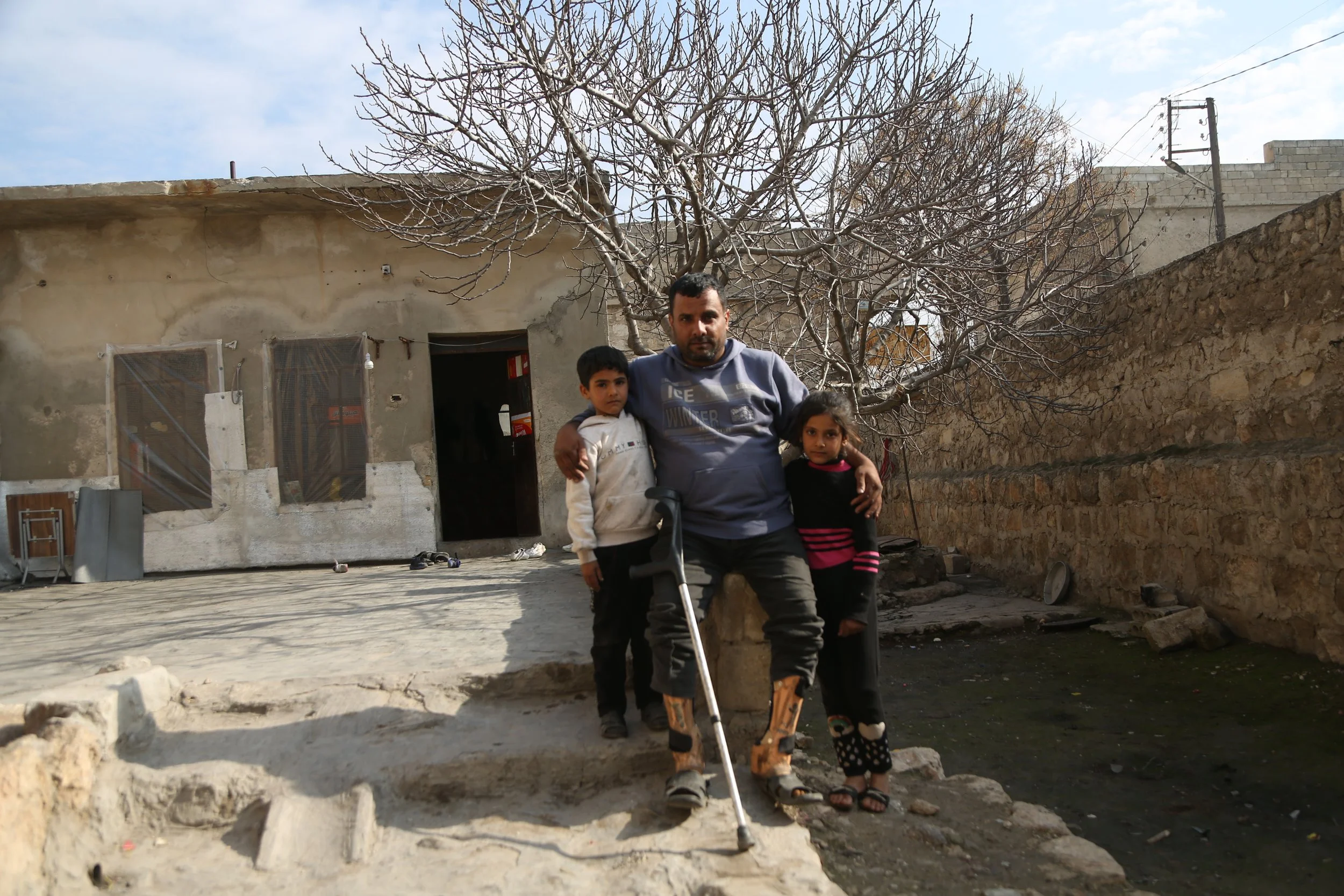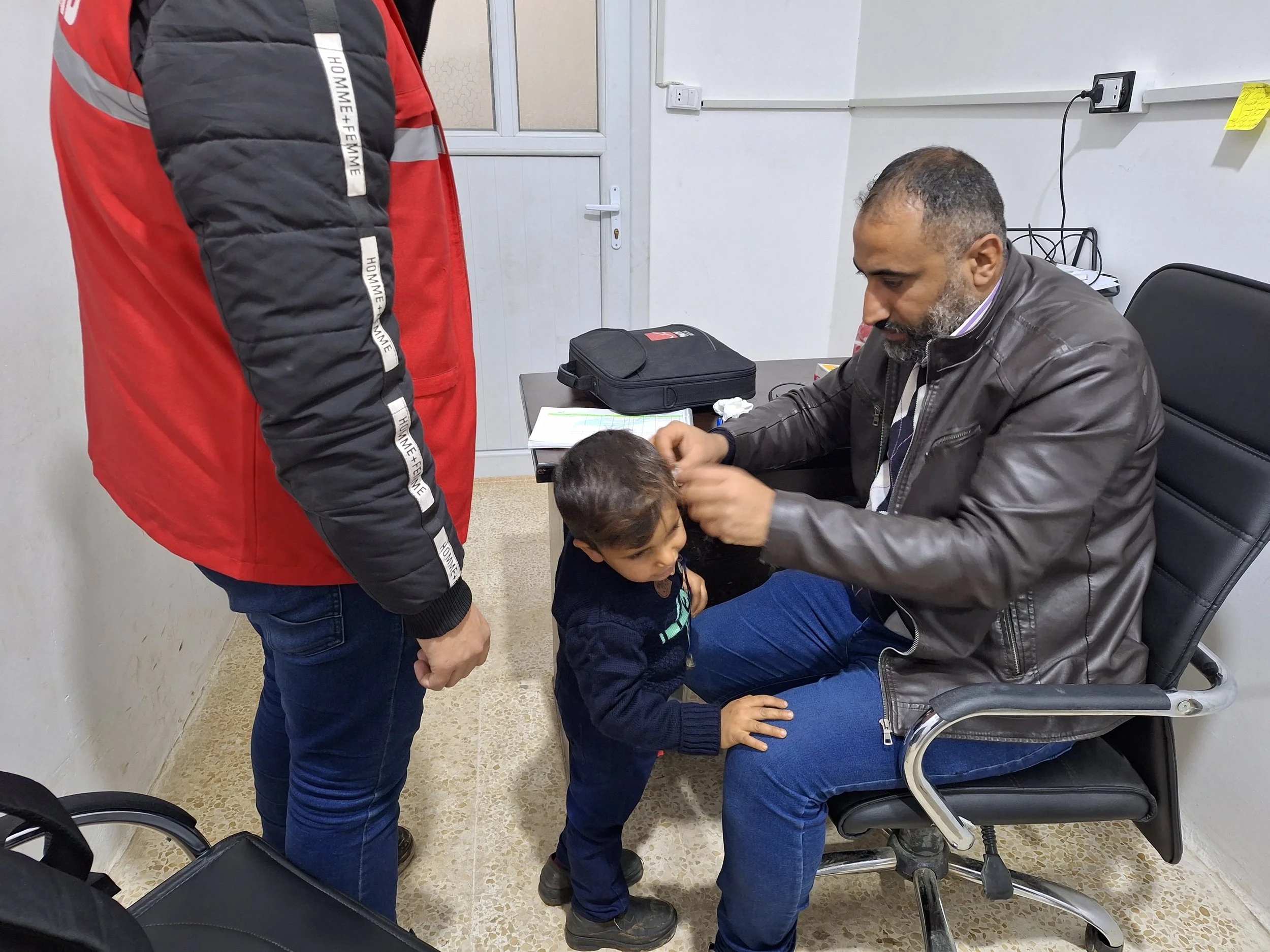We cannot leave behind one-third of Syrians
The Reality of Living with a Disability in Syria
After more than a decade of conflict, war injuries, destruction, and the lack of adequate infrastructure have left millions of Syrians in extreme vulnerability. Almost one third of the Syrian population—aged over two—now lives with some form of disability. In parts of northern Syria, the numbers are even higher, with the UN estimating that around 37 percent of the population in northeastern Syria has a disability. This figure is more than double the global average of 15 percent.
Omar, a 45-year-old former shoemaker from Azaz, putting on his prosthetics after loosing both of his legs in a mine explosion
People with disabilities in Syria face immense challenges: limited access to medical care and accessible spaces, a lack of prosthetics and adaptive equipment, barriers to education and employment. Social discrimination is a universal challenge, and Syria is no exception—people with disabilities continue to face barriers to inclusion, limiting their participation in society.
Beyond Humanitarian Aid – Creating Opportunities
SARD works to break cycles of dependency by ensuring that people with disabilities have access to financial stability and employment opportunities. SARD allocates at least 5% of places from all its livelihood and cash assistance programs specifically for people with disabilities. We are currently supporting families like Omar’s and Sanaa’s, through our ongoing project Karama, funded by Welthungerhilfe and the EU, providing essential cash assistance to 6,000 families in need.
Omar Al-Khalaf, a 45-year-old former shoemaker from Azaz, lost both of his legs in a mine explosion. Unable to continue his profession, he fell into extreme poverty and even considered pulling his daughter out of school to support the family. SARD’s cash assistance program helped him regain stability:
“This grant covered a good part of our needs. The most important impact was being able to secure what my children needed, especially for their education. Thanks to this support, I didn’t have to take my daughter out of school. I used part of the grant to buy my medicine, and the rest went toward school supplies for my children and heating for our home.” – Omar
Similarly, Sanaa, a mother paralyzed by polio, found relief through SARD’s cash assistance. She not only received cash support but also participated in our Core of Empowerment fair, where she showcased her sewing talent.
“It has made such a difference in our lives, especially during the winter months. Projects like this are a blessing because they ease that worry. They provide relief for heating expenses and household needs, helping families like mine face the season with less fear and more hope.” – Sanaa
The Core of Empowerment initiative and others like it, was designed to strengthen the social and economic inclusion of people with disabilities. It provided a platform for people with disabilities to display their talents and creativity through exhibitions, celebrating their abilities and contributions.
Creating Inclusive Spaces
Beyond financial stability and opportunity, true inclusion requires reshaping both attitudes and physical spaces that allows people with disabilities to fully participate in society.
Through awareness campaigns, we challenge social stigma and foster a culture of acceptance and inclusion. As part of the same Core of Empowerment initiative supported by the Syrian Cross Border Fund, we installed guide-boards across the Sarmada community, promoting respectful interactions and understanding of people with disabilities.
In our rehabilitation projects, SARD ensures that infrastructure and public spaces are accessible. Adapted sidewalks in markets improve mobility for those with physical disabilities, and ramps in schools provide equitable access to education. Our bus stops feature a designated wheelchair-friendly space that keep people safe from weather elements while they are waiting for public transportation and we are currently installing our first accessible swing! These accommodations foster a sense of belonging and enable people with disabilities to live with independence and dignity.
Transformative Urgent Care for Children
Costly treatments or therapies are often out of reach for families. Through our Emergency Case Fund, we assist children who need essential medical equipment, surgeries, or specialized services.
For Omar, who faces mobility challenges due to his disability, we purchased him a wheelchair so his mother didn’t have to carry him everywhere. Amira and Alaa, a young girl and boy with hearing impairments, received medical hearing aids and enrolled in speech rehabilitation, helping them connect with their peers and begin to learn how to speak.
The Path Forward
People with disabilities in Syria deserve more than survival—they deserve support, opportunities, inclusion, and a future.
“We have a disability, but God gave us great abilities!” – Sanaa





















